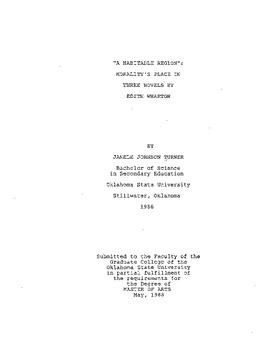| dc.contributor.advisor | Leavell, Linda | |
| dc.contributor.author | Turner, Janele Johnson | |
| dc.date.accessioned | 2015-08-19T16:06:47Z | |
| dc.date.available | 2015-08-19T16:06:47Z | |
| dc.date.issued | 1988-05-01 | |
| dc.identifier.uri | https://hdl.handle.net/11244/15729 | |
| dc.description.abstract | The understated drama and wit of Edith Wharton's prose style have long fascinated me. An avid reader of short stories, I found many of Wharton's to be compact masterpieces in complexity of theme and characterization. But her novels--Ethan Frome, Summer, The House of Mirth, The Fruit of the Tree, and The Age of Innocence--captured my interest most completely. In these longer works, I sensed not only a variety and intensity of characterization, but a morality too distinctive to be dismissed as a mere "strain" or "undercurrent." I noticed that often, this ethical tone in Wharton's novels was more than a mute and passive presence; rather, it served to shape theme and to charge certain characters with a singular animation lacking in others. | |
| dc.format | application/pdf | |
| dc.language | en_US | |
| dc.publisher | Oklahoma State University | |
| dc.rights | Copyright is held by the author who has granted the Oklahoma State University Library the non-exclusive right to share this material in its institutional repository. Contact Digital Library Services at lib-dls@okstate.edu or 405-744-9161 for the permission policy on the use, reproduction or distribution of this material. | |
| dc.title | "Habitable Region": Morality's Place in Three Novels by Edith Wharton | |
| dc.type | text | |
| dc.contributor.committeeMember | Walkiewicz, Edward P. | |
| dc.contributor.committeeMember | Klemp, Paul J. | |
| osu.filename | Thesis-1988-T948h.pdf | |
| osu.accesstype | Open Access | |
| dc.description.department | English | |
| dc.type.genre | Thesis | |
